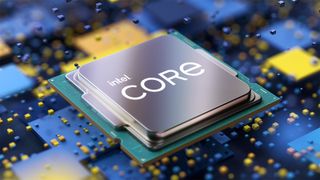Intel Alder Lake CPU spotted in first game benchmark
Alder Lake-S processor appears in Dota 2 benchmark

An Intel Alder Lake processor has been spotted in a game benchmark, suggesting that the development of 12th-gen chips is progressing nicely (even if we might not see the new silicon until later in 2021 than early rumors suggested).
The early engineering sample of an (unspecified) Alder Lake-S desktop CPU was found in the CapFrameX database by German tech site ComputerBase, and shows the chip running Dota 2 in a PC that has an Intel motherboard, 32GB of DDR5-4800 system RAM, plus an Nvidia RTX 3080 graphics card. No info is provided on the spec of the processor, sadly, except the clock speed it was running at – a relatively sluggish 2.2GHz.
- Here are the best gaming PCs
- We’ve picked out all the best processors
- And check out the best motherboards
The Alder Lake-powered rig managed to achieve an average of 120 frames per second in the Dota 2 result, but at this point – with the sample chip running at a clearly hamstrung 2.2GHz, scant other details on the PC spec, and no info on how the game was configured in terms of the graphics settings or resolution – that’s a pretty meaningless figure.
What it does tell us, however, is that an Alder Lake sample chip is already at an advanced enough stage to be able to run a game, and indeed the CPU ran Dota 2 last month – the benchmarking happened on April 5 to be precise. So that’s a positive indication that Intel will deliver on its promise of unleashing the 12th-gen desktop processors later this year.
Tight timing?
We’ve just heard that Alder Lake chips may not emerge until November, after previously hearing from the rumor mill that September might be Intel’s intended launch timeframe. Although to be honest, the latter timing always felt a little tight and would leave only a six-month gap between Rocket Lake and its successor (perhaps sailing too close to the wind when it comes to provoking buyer’s remorse from those who invested in the 11th-gen silicon).
Alder Lake, as you’re probably aware, will be a massive change, introducing a whole new socket (which of course entails new motherboards). It’ll work similarly to ARM’s big.LITTLE tech, using both normal CPU cores and low-power (highly efficient) ones. That’ll have obvious benefits for laptop owners in terms of power efficiency and battery longevity, but the ‘little’ cores will also have benefits for desktop PCs too – speculation points to a major performance leap over Rocket Lake.
- Check out the best PC components for your rig
Via VideoCardz
Get daily insight, inspiration and deals in your inbox
Get the hottest deals available in your inbox plus news, reviews, opinion, analysis and more from the TechRadar team.
Darren is a freelancer writing news and features for TechRadar (and occasionally T3) across a broad range of computing topics including CPUs, GPUs, various other hardware, VPNs, antivirus and more. He has written about tech for the best part of three decades, and writes books in his spare time (his debut novel - 'I Know What You Did Last Supper' - was published by Hachette UK in 2013).
Most Popular

